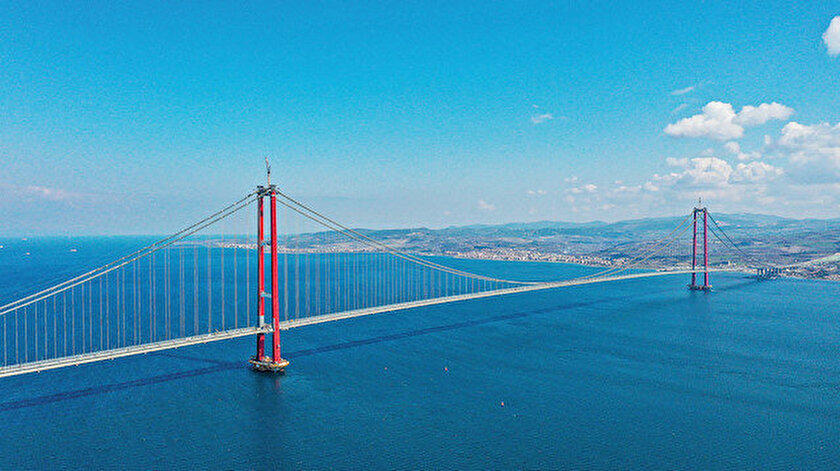Turkey opens Canakkale 1915 Bridge on March 18

By Yusuf Ozdemir
Turkey inaugurates the Canakkale 1915 Bridge, a project that connects Asia and Europe for the sixth time, the Yeni Shafak newspaper has reported.
President Recep Tayyip Erdogan is also expected to attend the opening ceremony of Turkey’s latest megaproject on March 18, the report added.
Transportation projects that have been implemented have played a significant role in Turkey's four-fold economic growth over the past 20 years.
The Yavuz Sultan Selim Bridge, the Marmaray intercontinental commuter rail line, the Eurasia Tunnel, and the Canakkale 1915 Bridge, built alongside the 15 July Martyrs and Fatih Sultan Mehmet bridges, connected the two continents for the sixth time and became an alternative route between Asia and Europe.
A total of $169.2 billion has been invested in transportation and communication over the past 20 years.
While Turkey's divided road length increased from 6,100 kilometers to 27,000 kilometers, 14,516 kilometers of high-standard roads and 2,418 kilometers of highways were put into service.
Tunnels, in particular, were used to bypass impassable mountains during the winter months. In this regard, Eurasia, Ovit, Bolu, Orhangazi/Samanl, and Pirinkayalar became significant tunnel projects. The 589-kilometer total tunnel length will be increased to 700 kilometers with the addition of 470 new tunnels until 2023.
Major progress was also made in air transportation. While the number of airports has grown from 39 to 56, it is expected to rise to 61 in 2022 as new airports are built.
Significant progress has also been made in railway construction. The railway's length has increased to 16,675 kilometers as a result of new investments in high-speed trains and conventional lines. The entire 12,800-kilometer railway network was rebuilt from the ground up. The Baku-Tbilisi-Kars Railway Project cemented Turkey's rail system's international prominence.
Many ports have been modernized for maritime transportation, which is an important way of trade and logistics. Filyos Port, with a capacity of 25 million tons (a 150-year-old Turkish dream), was inaugurated in 2021, and the ports have been linked to railway lines.
Professor Mustafa Ilicali, evaluating the impact of transportation projects on Turkey's economic development, stated that Turkey is in a geopolitical location where 67 countries can be reached in a 4-hour flight. Turkey has attracted investors due to its transportation projects and logistical opportunities, he added.
Due to its geographical location, Turkey is attractive for 1.6 billion people, with 38-trillion dollar GDP and 7-trillion dollar trade volume, Ilicali stressed.
"International investors, too, cannot overlook our country's potential. Turkey has now achieved investment-grade status as a result of its increased accessibility. With the Baku-Kars-Tbilisi and Marmaray railways, Turkey has become more advantageous in terms of time and cost in trade logistics between China and Europe, compared to the northern and southern corridors. Fuel, time, and the environment save Turkey 14 billion dollars per year. The annual contribution of these projects to employment has reached an average of 703, 000," he stated.
---
Follow us on Twitter @AzerNewsAz
Here we are to serve you with news right now. It does not cost much, but worth your attention.
Choose to support open, independent, quality journalism and subscribe on a monthly basis.
By subscribing to our online newspaper, you can have full digital access to all news, analysis, and much more.
You can also follow AzerNEWS on Twitter @AzerNewsAz or Facebook @AzerNewsNewspaper
Thank you!
